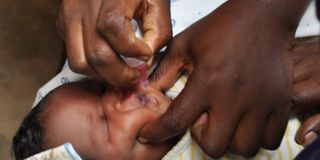WHO REMOVES NIGERIA FROM LIST OF POLIO ENDEMIC COUNTRIES

Nigeria undertook mass immunisation drives, repeatedly immunising over 45 million children under the age of five. File photo.
Nigeria has been removed from the list of polio endemic countries in what is being regarded as a “milestone” on the quest to eradicate the disease.
The announcement by the World Health Organisation (WHO), was made on September 25 at a meeting of the Global Polio Eradication Initiative (GPEI) in New York.
It follows Nigeria going more than a year without a case of wild - naturally occurring - polio. Three years without cases are required before it can be declared polio free.
The decision means there are just two endemic countries - Pakistan and Afghanistan - where transmission of the paralysing virus has never been interrupted.
Jean Gough, Unicef country representative in Nigeria, said: “This is an important milestone, but it is too early to celebrate. We need to continue the efforts at every level if polio is to be eradicated.”
Polio is spread by poor sanitation and contaminated water and usually affects children.
The virus attacks the nervous system and can cause irreversible paralysis - usually of the legs - within hours.
GPEI was established in 1988 when tens of thousands of children in more than 125 countries were paralysed by polio each year.
Partner organisations include the WHO, Rotary International and the Bill and Melinda Gates Foundation.
Nigeria’s progress against polio has been hard-fought.
In 2003, some northern states boycotted the oral polio vaccine for nearly a year after scare stories that it caused sterilisation. It led to the virus spreading to many countries that had been declared polio free.
In 2013, nine vaccinators were shot dead in Kano. But instead of being a deterrent, it galvanised support at every level.
The Nigerian government declared polio a national health emergency and greatly increased the number of vaccinators and community and religious leaders voiced their support.
As a result, the number of families refusing to have their children immunised has decreased sharply.
How Nigeria achieved success
As recently as 2012, Nigeria accounted for more than half of all polio cases worldwide. Since then, a concerted effort by all levels of government, civil society, religious leaders and tens of thousands of dedicated health workers have resulted in Nigeria successfully stopping polio.
More than 200, 000 volunteers across the country repeatedly immunised more than 45 million children under the age of five years, to ensure that no child would suffer from this paralysing disease.
Innovative approaches, such as increased community involvement and the establishment of Emergency Operations Centres at the national and state level, have also been pivotal to Nigeria’s success.
Polio, which can cause lifelong paralysis, has now been stopped nearly everywhere in the world following a 25-year concerted international effort.
Since 1988, the incidence of polio has been reduced by more than 99 percent. At the time, more than 350,000 children were paralysed every year, in more than 125 endemic countries.
BBC News & WHO.




